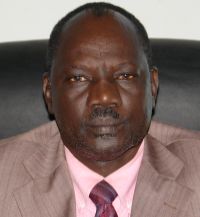Many South Sudanese misunderstand security deal with Sudan – Minister
October 10, 2012 (JUBA) – South Sudan’s Minister of Parliamentary Affairs, Michael Makuei Lueth said Tuesday that many members of South Sudanese public have not understood the deal reached with neighbouring Sudan last, especially in regard to security arrangements.

“This is just a provisional arrangement. It does not demarcate borders between the countries. The public needs to be enlightened about importance of the bilateral agreement”, said Lueth in an attempt to diffuse the public’s discontent over location of the buffer zone and the failure to resolve the issue of disputed areas.
“We have to show the whole world that we responsible people,” said Lueth, who was a member of the negotiating team on behalf of the government of South Sudan at the African Union mediated talks.
“We should accept the agreement. It has a lot of benefits”, he said.
The senior member of South Sudan’s governing Sudan People’s Liberation Movement (SPLM) made the comments during a weekly media forum held by the ministry of information.
Minister Lueth is also a member of the government “special select” committee tasked by the cabinet to educate members of the general significance of the deal which the two sides had signed.
The Speaker of the Warrap State Legislative Assembly, Madot Dut Deng, said Tuesday that he supported the deal.
The agreement allows South Sudan to resume exporting its oil through Sudan and created demilitarized buffer zone along the 2,000 kilometre border. The two sides also agreed to allow citizens of each country “four freedoms” in the other nation – to enjoy freedom of residence, freedom of movement, freedom to undertake economic activity and freedom to acquire and dispose property.
Officials and residents from Northern Bahr el Ghazal State have reacted negatively to the deal as it allocates an area known as Mile 14 as part of the buffer zone, despite the location of the buffer zone being 10 kilometres either side of a notional border proposed by the African Union which will have no bearing on any final resolution.
Warrap State, which is the home state of South Sudan’s President welcomes the deal, the parliament’s speaker said, adding that it was a “positive step and it is the only way forward to resolving the remaining issues.”
The major unresolved issue is the status of the Abyei area which South Sudan hopes will be transferred to Warrap State through a referendum. The AU has proposed that a vote be held in October 2013 but the two sides cannot agree on who can take part.
The 2005 Comprehensive Peace Agreement (CPA) set up a plebiscite on the issue that was due to take take place in January 2011 on the same date that South Sudanese voted to secede.
South Sudan was willing the accept the African Union’s proposal on Abyei by Khartoum refused and wants more members of the Misseriya tribe to be allowed to vote. Under the Abyei protocol of the CPA only those “resident” in the area would be accorded full voting rights.
The main group resident in the area are the southern aligned Dinka Ngok who would be expected to vote to join South Sudan. The Misseriya are a nomadic group found in Sudan’s Kordofan and Darfur region’s as well as in other parts of central Africa.
Some members Misseriya enter Abyei and other areas of South Sudan during the dry season to find pasture and water for their cattle for months at a time. Khartoum rejected the AU proposal as it did not believe enough of the Misseriya tribe would be able to cast a ballot.
Despite the impasse over Abyei, Speaker Deng said the Addis Ababa deal was a “positive beginning. It is good to have cooperation between the two countries. This will encourage them to resolve other remaining issues amicably.”
(ST)
